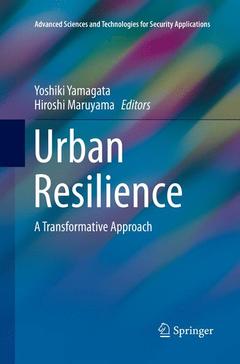Urban Resilience, Softcover reprint of the original 1st ed. 2016 A Transformative Approach Advanced Sciences and Technologies for Security Applications Series
Coordonnateurs : Yamagata Yoshiki, Maruyama Hiroshi

This book is on urban resilience ? how to design and operate cities that can withstand major threats such as natural disasters and economic downturns and how to recover from them. It is a collection of latest research results from two separate but collaborating research groups, namely, researchers in urban design and those on general resilience theory. The book systematically deals with the core aspects of urban resilience: systems, management issues and populations.
The taxonomy can be broken down into threats, systems, resilience cycles and recovery types in the context of urban resilience. It starts with a discussion of systems resilience models, focusing on the central idea that resilience is a moving average of costs (a set of trajectories in a two-player game paradigm). The second section explores management issues, including planning, operating and emergency response in cities with specific examples such as land-use planning and carbon-neutral scenarios for urban planning. The next section focuses on urban dwellers and specific people-related issues in the context of resilience. Agent-based simulation of behaviour and perception-based resilience, as well as brand crisis management are representative examples of the topics discussed. A further section examines systems like public utilities ? including managing power supplies, cyber-security issues and models for pandemics. It concludes with a discussion of the future challenges and risks facing complex systems, for example in resilient power grids, making it essential reading for a wide range of researchers and policymakers.
Part I. Systems Resilience, A 30,000 Feet View.- 1. Taxonomy and General Strategies for Resilience.- Part II. Planning Urban Resilience.- 2. Urban Economics Model for Land-Use Planning.- 3. Modelling Urban Heatwave Risk in Adelaide, South Australia.- 4. Flood Risk Management in Cities.- 5. Land-Use Planning for Depopulating and Aging Society in Japan.- Part III. Responding to Shocks.- 6. Perception-Based Resilience: Accounting for Human Perception in Resilience Thinking with Theoretic and Model Bases.- 7. Resilient Community Clustering: A Graph Theoretical Approach.- 8. Agent-based Modeling ― a Tool for Urban Resilience Research.- 9. Urban Form and Energy Resilient Strategies: A Case Study of the Manhattan Grid.- 10. Disease outbreaks: Critical biological factors and control strategies.- Part IV. Measurement of Urban Resilience.- 11. Measurement of Urban Resilience.- 12. Computational Framework of Resilience.- 13. Urban resilience assessment: Multiple dimensions, criteria, and indicators.- Part V. Future Challenges.- 14. Bridging People Back In: Crisis Planning and Response Embedded in Social Contexts.- 15. From Resilience to Transformation via a Regenerative Sustainability Development Path.
Date de parution : 06-2018
Ouvrage de 319 p.
15.5x23.5 cm
Date de parution : 08-2016
Ouvrage de 319 p.
15.5x23.5 cm
Thèmes d’Urban Resilience :
Mots-clés :
Emergency Preparedness Scenario Analysis; Hazard Mitigation; Modelling System Resilience; Resilience Cycles and Recovery in Urban Settings; Risk Management Analysis; Urban Management and Risk Mgmt; Urban Resilience Modelling; Urban Security Response Planning; urban geography and urbanism



